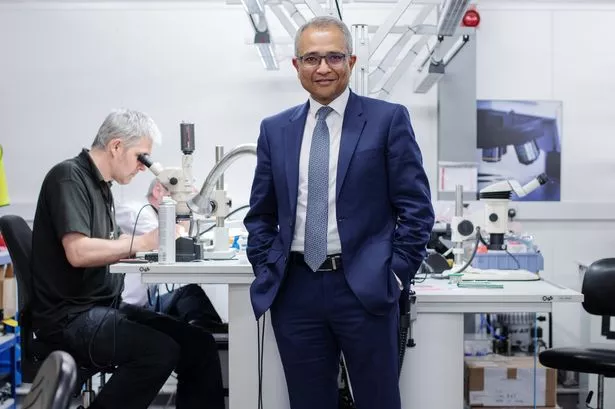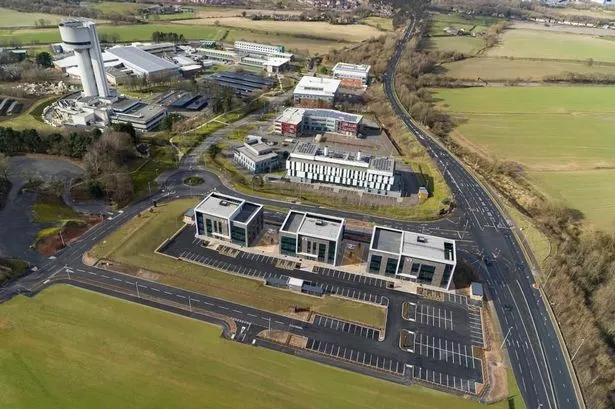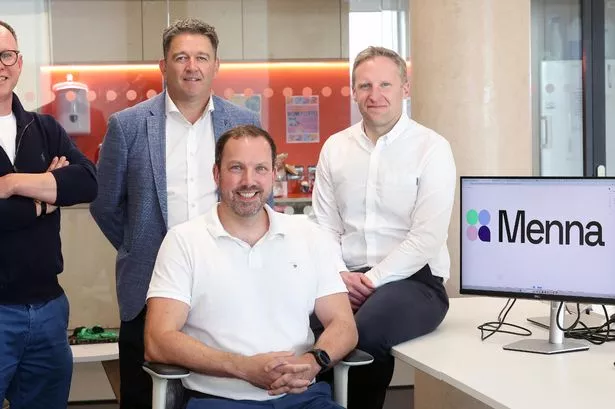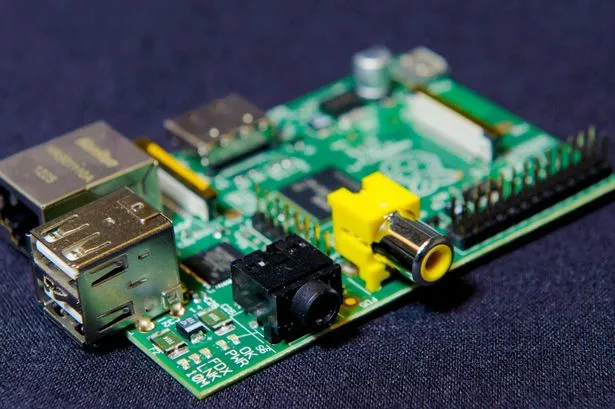
County Durham tech firm Kromek secures £2m contract with Ministry of Defence
Radiation detection pioneer Kromek has been awarded a £2m contract by the Ministry of Defence (MOD). The NETPark based business, which specialises in the development of radiation and bio-detection technology, won the deal through a competitive tender process and will now supply nuclear radiation detectors and ancillary products in its current financial year, ending April 2025. The firm said the contract to supply detection equipment for military deployment underscores its critical role in supporting national defence initiatives. The company will deliver its handheld gamma and neutron detector, the D5 RIID, along with its new Alpha Beta probe attachment as well as other associated products. The Alpha Beta probe was unveiled in November 2023 and enhances the D5 RIID’s capability by enabling the detection of alpha and beta radiation. Arnab Basu, CEO of Kromek, said: “We are delighted to have won this important contract from the MOD, a key strategic customer for Kromek. The rigorous tender process reflects the confidence in the strength of our solutions, and we are proud to provide the MOD with our latest technology, including the Alpha Beta probe, so soon after its launch. This contract further solidifies our contribution to the UK’s national defence efforts, and we look forward to deepening our partnership with the MOD.”

New centre to boost next generation life sciences firms
A new centre to support the next generation of health and life sciences businesses is being set up in Daresbury. The Health Tech Business Incubation Centre (Health BIC) will be established at the Science and Technology Facilities Council (STFC) Daresbury Laboratory following a £1.8m innovation zone grant from the Liverpool City Region Combined Authority. It will provide tailored support to nurture new and early-stage businesses working in the health and life sciences sectors. Support will include: A spokesman said the four-year programme will be looking to recruit businesses with high-growth potential that demonstrate an ability to be coached. Tailored support and funding will be given to each applicant over an 18-month incubation period. Paul Vernon, executive director for the Business and Innovation Directorate and Head of Daresbury Laboratory at STFC, said: “The Health BIC will be part of a family of business incubation facilities at STFC’s Daresbury Laboratory. “We work with partners such as the Medical Research Council, Medicines Discovery Catapult and industry bodies and universities to create a rich package of support. “The model has resulted in 20 times return on investment on economic activity from businesses who have participated in our incubation programmes to date. We hope to replicate that successes as we work with businesses from Liverpool City Region to drive more innovation in the sector and see more investment in the region.” Halton is on of six member councils of the Liverpool City Region. The Health BIC is among the first of 21 Life Sciences Innovation Zone projects that are expected to create 8,000 new jobs and attract up to £800m investment to the Liverpool City Region over the next 10 years.

Revolut hits 10 million UK customers milestone, set to launch banking services
Revolut, the UK fintech behemoth, has hit a new milestone with 10 million customers, affirming its status as one of the countrys leading fintech firms. The company has witnessed remarkable growth, boasting an addition of close to 2 million new customers in 2024 alone, as reported by City AM. Revolut has had a year marked by significant moments, including a recent secondary share sale that pegged the valuation at $45 billion, and the issuance of a restricted UK banking licence by the Prudential Regulation Authority (PRA) as of July. Moreover, the firm has launched several new offerings for its UK clientele this year, such as mobile wallets and Revpoints, with plans to relocate its global headquarters to Canary Wharf on the horizon. Francesca Carlesi, the CEO of Revolut UK, said: "Today's announcement is a tremendous achievement for Revolut. Ten million customers across the UK makes us one of the largest payments businesses in the market, and we are incredibly grateful to our growing customer base, who continue to use Revolut more and more." "The UK is our home market, and is the base for the company's wider global expansion plans. As we work towards launching the bank in the UK in the coming months, we will continue to offer products and services that improve the financial lives of everyone who uses Revolut." Adding to its ambitious growth strategy, Revolut has also recently announced intentions to commence operations in India next year. At present, the app is accessible across most of mainland Europe, with Romania, Poland, France, Ireland, and Spain being its primary markets. Revolut has gained popularity in these regions by offering a variety of financial services, such as currency exchange, stock trading, and access to cryptocurrency.

Cardiff fintech start up Menna boosted with £500,000 equity investment
A Cardiff fintech start-up that has developed a generative AI powered platform to help small firms make smarter financial decisions has secured a £500,000 investment to supports commercialisation plans. A syndicate of 20 business angels, led by lead investor Simon Bell, has invested £250,000 into Menna Their investment has been matched funded with a further £250,000 in equity backing from the Development Bank of Wales through its Wales Angel Co-investment Fund. Read More:Latest equity deals in Welsh business Read More:Why we need to devolve research council funding Founded in August last year by Nick Carlton and Dan Mines, Menna helps small business owners to make better financial decisions by combining generative AI with rich real-time data. Mr Carlton was previously chief product officer for Confused.com and blockchain protection venture Coincover, while Mr Mines was chief information officer for Admiral Money and chief product officer for European open banking platform Yolt. The firm’s Menna.ai platform offers real-time transaction alerts, forecasts, insights, smart recommendations savings and funding offers. It is free to use and connects with banking, e-commerce, EPOS (electronic point of sale) and accounting software accounts. The company is based at the Cardiff University Social Science Research Park (SPARK). It will use the £500,000 equity investment to accelerate the development of its product ready for market, recruiting a team of five tech specialists and preparing for a full launch in early 2025. Menna.ai will be marketed direct to customer and via partnerships with third party financial services providers throughout the UK. Co-founder Mr Carlton said: “We believe that every small business owner should have access to a finance manager, and that’s why we created Menna. There are 5.5 million small businesses in the UK, but most owners lack the skills and resources to run their businesses effectively because they don’t have formal financial training or access to advice. Mr Mines added: “We have developed a digital finance assistant for small businesses. From decisions on the affordability of recruitment to funding and capital expenditures, Menna helps small business owners make better financial decisions. “We’ve worked hard over the last year to build the proof of concept, embed the business within the local ecosystem and become investment ready. With home-grown support, this funding from our investors enables us to get Menna customer ready with further development and investment in people who want to join us on our journey as we scale-up from a Cardiff-based start-up to what we hope will be a UK success story that is rooted firmly in Wales and returning value back.” Mr Bell of fintech syndicate Rebel Syndicate is the lead investor. He said: “Menna.ai is like a finance director in your pocket, offering clear, data-driven insight to help business owners to stay on top of their finances and manage everything in one place. As a tech and data business that is proud to be Welsh and committed to remaining in Wales, it is an attractive proposition to investors who, as a syndicate, have collectively realised the extra firepower of match-funding from the Development Bank of Wales.”

Petards posts steady revenues of £4.4m but warns full year results may fall short of expectations
Tyneside tech firm Petards has posted steady half-year revenues but warned that full year results may fall short of forecasts. The Team Valley business is involved in developing, supplying and maintaining advanced security and surveillance technologies for the rail, traffic, defence and communications sectors, with key products including its subsidiary QRO’s Harrier AI camera and its eyeTrain rail surveillance solution. In the interim results for the six months ended June 30 the firm posted revenues of £4.415m, slightly up on the £4.403m posted in the same period last year. Its operating losses widened from £489,000 to £878,000, as a result of its £2.85m acquisition of Affini Technology in June. Adjusted Ebitda (earnings before financial income and expenses, tax, depreciation, amortisation, exceptional items, acquisition costs and share based payment charges) was £33,000. Bosses said that trading in the first six months was affected by delays in orders expected to be received and delivered in part in the period. However, since the period end a number of orders have now been received, although they will now be delivered into 2025 rather than being fully deliverable in 2024. During the period it saw strong sales of QRO’s newly-launched Harrier AI camera and highlighted a boost in its order book, which stood at £7.1m at June 30 - up from £2.4m at the end of last year. The company has also received several significant contracts wins following the period end, for its rail business, QRO and Affini. Raschid Abdullah, chairman, said: “The successful acquisition of Affini and the improvement in the Group’s order book post June 2024 is encouraging. Order successes announced since June total over £2.5m across QRO, Affini and Rail. “Given the difficult market conditions in Rail in recent years, those orders were particularly pleasing and had been anticipated for some time. While there remain other prospects still to be awarded that fall into this category, whether it is due to more certainty arising following the election or other factors, it does feel as if rail customers are now starting to approve projects that have been in abeyance for some time. “We are also pleased with Affini’s encouraging start since becoming part of the Group and expect it will be earnings accretive post funding costs in the current year and beyond.

Raspberry Pi post stronger than expected profits following flotation
Budget computer firm Raspberry Pi has revealed that profits were stronger than expected in its first update since floating on the London stock market earlier this year. Shares in the company, whose computers are made in Wales, swung higher in early trading as a result. The Cambridge-based company raised £178.9m in an initial public offering (IPO) in June, in a major boost to the London Stock Exchange following a dearth of new listings over the past year. Earlier this week, the company was added to the FTSE 250 index. The stock market debutante told shareholders that revenues jumped by 61% to £107.9m over the six months to June 30, compared with the same period a year earlier. It said it was aided by “strong uptake” of its Raspberry Pi5 product. Read More: RWE submits plans for major N Wales wind farm Read More: Big Interview with Green Man founder Fiona Stewart As a result, the group said: “Having previously expected performance to be weighted towards the second half of the year, this is no longer the case, with profitability in the first half ahead of internal expectations.” Raspberry Pi added that it now anticipates higher unit volumes for the second half of this year on the back of new product launches. Eben Upton, chief executive of Raspberry Pi, said: “In continued pleasing trading in the first half, we saw strong uptake of our latest flagship SBC (single board computer), Raspberry Pi5, the launch of the Raspberry Pi AI Kit, and the successful ramp to production of RP2350, our second-generation microcontroller platform. “The higher than usual customer and channel inventory levels which were evident at the time of the IPO have continued to unwind, and there is a growing sense that this will have concluded by the year end. “We have an extraordinary team, a world-class product set backed up by an exciting future road map, and a loyal and engaged customer base that we can continue to grow.”